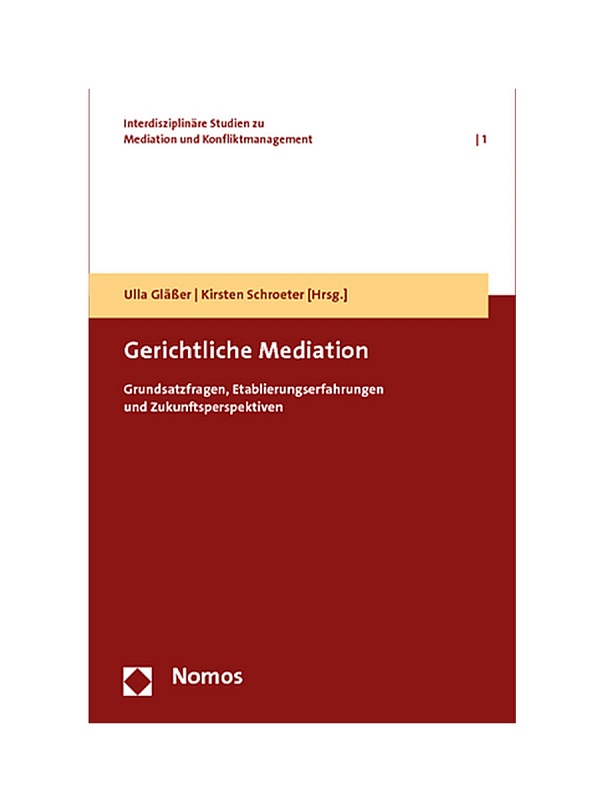Research and transfer projects in the field of court mediation
Accompanying research on court mediation
In 2007 and 2008, the master’s thesis "Die Gerichtliche Mediation in Strafvollzugssachen" by Dr Anja Schammler as well as the evaluation concept for the project "Court Mediation in Prison Matters" were written in cooperation with the Berlin Tegel Prison as part of the accompanying research on court mediation in the prison system at the Berlin Regional Court.
In 2009, the Institute for Conflict Management prepared an evaluation concept for the first nationwide pilot project on "Judicial Mediation in Prison Matters", which was carried out at Berlin Regional Court and Berlin Tegel Prison. This essentially consists of self-evaluative, quantitative surveys, which are combined with qualitative interviews and are intended to provide information on the development of the project.
In 2009, the Ministry of Justice of the State of Brandenburg and the Brandenburg Higher Regional Court jointly decided to set up a pilot project for the introduction of judicial mediation in the ordinary jurisdiction of the State of Brandenburg. The pilot phase of this project was scientifically monitored by the Institute for Conflict Management in the person of Prof Dr Ulla Gläßer, LL.M. (UC Berkeley) and Nicole Becker in collaboration with Dr. Heidi Ittner with the aim of systematically evaluating the course of the pilot and feeding the resulting findings and knowledge into the optimisation of the further development of judicial mediation in Brandenburg.
The scientific monitoring of the pilot phase was carried out on three levels:
- Level 1: Cross-case, quantitative survey (collection and analysis of relevant project data in quantitative terms as a basis for scientific monitoring and evaluation)
- Level 2: Case-specific, qualitative evaluation of the course of the project (in the form of standardised questionnaires to collect qualitative impressions of the mediation participants)
- Level 3: Scientifically sound project support (advising the court mediation coordinators on the preparation and implementation of key decisions on the further project design)
The results of the scientific monitoring and evaluation of the pilot phase of the introduction of court mediation in the ordinary jurisdiction of the state of Brandenburg can be assessed as very positive overall. In both quantitative and qualitative terms, court mediation has proven to be an enrichment of the procedural system and an opportunity for consensual conflict resolution.</p
To the final report of the accompanying researchVolume "Judicial Mediation"
The inaugural volume of the new series "Interdisciplinary Studies on Mediation and Conflict Management" is dedicated to the rapidly developing field of court mediation, which is presented and critically reflected on three levels:
The first section contains cross-sectional observations on the current state of court mediation in Germany (legal foundations, organisation and acceptance of the procedure, training of judge mediators, role of lawyers, relationship to out-of-court mediation, etc.). The second section contains exemplary case studies and specific establishment experiences in various jurisdictions and federal states. Finally, questions of quality assurance are reflected upon and possible future prospects for the further development of court mediation are outlined.
The 25 individual contributions were written by academics and practitioners, including numerous judge mediators, so that the volume incorporates a wide range of perspectives and practical experience in the field of court mediation.
Fundamental questions, establishment experiences and future perspectives
Edited by Prof Dr Ulla Gläßer, LL.M. (UC Berkeley) and Dipl.-Psych. Kirsten Schroeter
2011, 439 p., paperback, 44,- €, ISBN 978-3-8329-5451-2
(Interdisciplinary Studies on Mediation and Conflict Management, Vol. 1)
Further information on the book and authors.
Series of symposia on judicial mediation
Between 2007 and 2010, the Court Mediation Symposium Series offered a series of events for dialogue and exchange between judges, lawyers, academics and other stakeholders in the justice system. The aim was to establish court mediation as an integral part of the German justice system and to continuously develop it further.
In close cooperation with the master's degree programme in mediation and various judicial institutions, the series addressed current challenges and potentials of mediation in judicial practice and pursued several key objectives: Bringing together experts from various fields to share experiences and jointly develop approaches to improve judicial mediation. The inclusion of speakers and participants from other countries such as Austria and Poland facilitated an international exchange that offered valuable insights into the mediation experiences and practices of other countries.
The individual events in the symposium series focussed on specific aspects of judicial mediation. Various models for implementing mediation in the judicial system were discussed, as well as the associated practical challenges and benefits. Another topic was the role of mediation in the spectrum of alternative dispute resolution procedures. Questions of quality assurance and professional standards were also discussed. Collaboration between judges, lawyers and mediators was also the subject of consideration alongside current trends and future developments.
Overview of activities
In light of the dynamic development of court mediation, the focus of the 3rd Berlin Symposium on Court Mediation on 21 January 2010 was on clarifying the future role of court mediation in the spectrum of alternative dispute resolution procedures. The symposium was once again organised in cooperation between the master's degree programme in mediation and the Institute for Conflict Management with the Berlin Bar Association, the Berlin Regional Court and the Berlin Coordination Office for Court Mediation.
The participants, organisers and speakers from 12 German federal states, Poland and Austria critically discussed the status quo of court mediation and the still controversial fundamental questions regarding the factual justification of court mediation, the specific added value compared to contentious proceedings and the interplay with or competition between court mediation and out-of-court mediation.
In March 2010, a German article about the symposium appeared in the Berliner Anwaltsblatt.
German conference reportThe 2nd Berlin Symposium on Court Mediation from 19-21 June 2008 focused primarily on questions of professionalisation and institutionalisation that have arisen from the dynamic development of court mediation in Germany in recent years. At the symposium, participants and speakers from 11 German federal states as well as from the USA discussed different establishment models and their specific challenges and potentials. The perspectives and experiences of judges, lawyers and academics entered into a constructive dialogue.
The symposium was organised by the master's degree programme in mediation and the Institute for Conflict Management together with the Berlin Regional Court, the Coordination Office for Court Mediation in Berlin and the Berlin Bar Association.
German conference reportOn 27 March 2007, the master's course in Mediation at the European University Viadrina Frankfurt (Oder), together with the Berlin Court of Appeal and the Berlin Bar Association, organised the first Berlin Symposium on Court Mediation entitled "Judges and Lawyers in Dialogue".
The event was organised to mark the first anniversary of court mediation at Berlin's civil courts. The first step was therefore to take stock and recognise what has been achieved so far. The Advisory Board for Court Mediation in Berlin, which is made up of judges and lawyers, was presented as an example of successful cooperative and quality-assuring support for a court mediation project. In addition, the participants and speakers critically analysed the nationwide concepts and offers of court mediation and their benefits in presentations and working groups.
As a result of the symposium, participants concluded that the dialogue between judges, lawyers and (mediation) academics is necessary and fruitful in order to develop design impulses for the constructive further development of court mediation in Germany.
German documentation of the symposium
